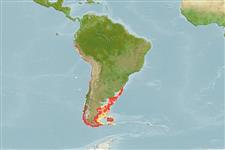Common names from other countries
Environment: milieu / climate zone / depth range / distribution range
Ecologia
; estuarina; intervalo de profundidade 0 - 100 m (Ref. 356), usually 4 - 20 m (Ref. 89833). Temperate, preferred 12°C (Ref. 107945); 7°S - 56°S, 81°W - 52°W
Southeast Pacific and Atlantic Ocean: From Pacasmayo, Peru to the Strait of Magellan and Beagle Channel including Juan Fernández Islands and to southern Brazil in the Atlantic including Falkland Islands. Introduced in the UK. Subtropical to temperate.
Length at first maturity / Tamanho / Peso / Idade
Maturity: Lm ?, range 4 - 4 cm Max length : 26.0 cm SHL macho/indeterminado; (Ref. 126826)
Life cycle and mating behavior
Maturidade | Reprodução | Desova | Ovos | Fecundidade | Larvas
Members of the class Bivalvia are mostly gonochoric, some are protandric hermaphrodites. Life cycle: Embryos develop into free-swimming trocophore larvae, succeeded by the bivalve veliger, resembling a miniature clam.
SAUP Database. 2006. (Ref. 356)
Status na Lista Vermelha da IUCN (Ref. 130435: Version 2024-1)
Status no CITES (Ref. 108899)
Not Evaluated
Not Evaluated
Uso pelos humanos
Pescarias: espécies comerciais
FAO - Aquacultura: produção; pescarias: landings | FishSource | Sea Around Us
Ferramentas
Fontes da internet
Estimates based on models
Preferred temperature
(Ref.
115969): 7.5 - 20.5, mean 12.5 (based on 198 cells).
Vulnerabilidade
Low vulnerability (16 of 100).
